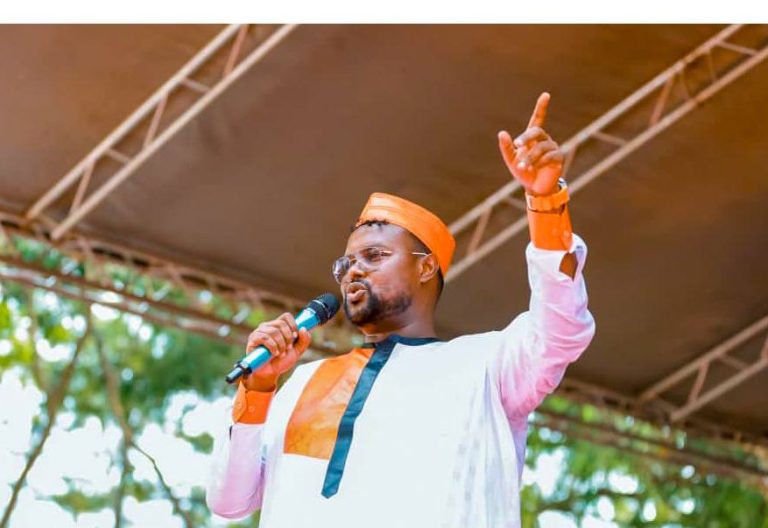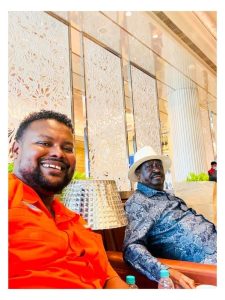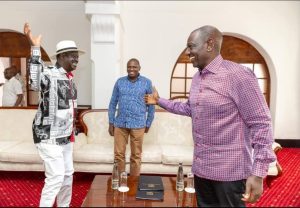Politics
Baba Was Consolidating a Stronger ODM to Endorse Ruto in 2027, Raila’s Close Confidant Salah Oketch Reveals
“He knew that staying close to government was not surrender; it was strategy,” Salah said.

A close friend of the late former Prime Minister Raila Odinga, Oketch Salah, has disclosed new details about the veteran politician’s final political vision, saying that he had confided in him during their stay in India that he intended to strengthen the Orange Democratic Movement (ODM) as part of a broader plan to endorse President William Ruto for re-election in 2027.
Speaking during an ODM consultative meeting at Siaya Senator Oburu Odinga’s home on Friday, October 24, Salah urged supporters in the Nyanza region and across the ODM network to remain part of President Ruto’s broad-based government, arguing that doing so would honour Raila’s wishes and secure the political relevance of his legacy. Salah said Raila envisioned a future where ODM would not merely serve as the opposition but as an active participant in national governance.
“Baba alikuwa anataka kumsport Ruto; alitaka ODM iwe na nguvu ndio aendorse Ruto 2027,” Salah told the gathering, insisting that the late ODM leader’s remarks cautioning members against premature 2027 campaigns were part of a larger strategic plan.
According to him, those statements, which some interpreted as Raila’s last instruction to focus on unity and development, were in fact meant to prepare the ground for a structured endorsement of Ruto’s re-election bid.
Salah recounted his final days with Raila in India, where the former Prime Minister was undergoing treatment. He said Raila repeatedly spoke about his desire to consolidate ODM’s internal unity, broaden its national reach and position the party as a key pillar of Kenya’s political stability. “He was clear that ODM needed to evolve with the times. He told me, ‘Salah, we must make ODM strong and national, not just for elections but for the country’s future,’” he said.
He further described Raila’s political spirit as one deeply inclined toward unity and stability, noting that even in his final months, the former Prime Minister was determined to build bridges across political divides. Salah said Raila believed that aligning with President Ruto’s administration would ensure the country remained cohesive and that ODM would maintain a decisive voice in national affairs.
“Raila understood that Kenya’s politics was shifting,” Salah added. “He wanted ODM to be at the centre of that change, to work with the government of the day rather than fight it. That was his last great political vision.”
Salah warned that if ODM and the Luo community failed to follow Raila’s roadmap and withdraw from the broad-based government, they risked long-term political isolation. He called on party members to rally behind Oburu Odinga and the ODM leadership to sustain Raila’s agenda of cooperation, inclusivity, and continued engagement with President Ruto’s administration.
“He knew that staying close to government was not surrender; it was strategy,” Salah said.
“He wanted to see a Kenya where competition would not translate into division, and where ODM’s ideas would shape policy even from within government.”
The revelation has stirred intense discussion within ODM and among political analysts.
While a section of party loyalists welcomed the statement as consistent with Raila’s recent overtures to State House before his death, others have expressed scepticism.
Political analyst Herman Manyora dismissed the claims, warning ODM members against what he termed “an attempt to rewrite history.” Manyora argued that Raila never publicly announced an endorsement of Ruto and that his commitment to multi-party democracy was rooted in holding power to account.
Nevertheless, Salah’s remarks have added a new dimension to the post-Raila political discourse, coming at a time when ODM is grappling with questions about succession, direction, and unity following the death of its founding leader. They also coincide with growing signals from President Ruto that his administration is open to collaboration with ODM, with the Head of State recently saying that “ODM will either form the next government or be part of it.”
As the debate rages, one thing is clear: Raila Odinga’s influence continues to define Kenya’s political conversation, even in death.
If Salah’s account is accurate, then the former Prime Minister’s final act was not of defiance, but of foresight — a carefully laid plan to keep ODM relevant and Kenya united long after he was gone. Whether the party chooses to follow that path remains the next great test of his enduring legacy.
Kenya Insights allows guest blogging, if you want to be published on Kenya’s most authoritative and accurate blog, have an expose, news TIPS, story angles, human interest stories, drop us an email on [email protected] or via Telegram
-

 Grapevine2 weeks ago
Grapevine2 weeks agoAlleged Male Lover Claims His Life Is in Danger, Leaks Screenshots and Private Videos Linking SportPesa CEO Ronald Karauri
-

 Grapevine1 week ago
Grapevine1 week agoRussian Man’s Secret Sex Recordings Ignite Fury as Questions Mount Over Consent and Easy Pick-Ups in Nairobi
-

 News4 days ago
News4 days agoTHE FIRM IN THE DOCK: How Kaplan and Stratton Became the Most Scrutinised Law Firm in Kenya
-

 Investigations6 days ago
Investigations6 days agoMulti-Million Dollar Fraud: Three Kenyans Face US Extradition in Massive Cybercrime Conspiracy
-

 Economy5 days ago
Economy5 days agoIran Demands Arrest, Prosecution Of Kenya’s Cup of Joe Director Director Over Sh2.6 Billion Tea Fraud
-

 Business6 days ago
Business6 days agoA Farm in Kenya’s Rift Valley Ignites a National Reckoning With Israeli Investment
-

 Africa1 week ago
Africa1 week agoFBI Investigates Congresswoman Ilhan Omar’s Husband’s Sh3.8 Billion Businesses in Kenya, Somalia and Dubai
-

 Business2 weeks ago
Business2 weeks agoM-Gas Pursues Carbon Credit Billions as Koko Networks Wreckage Exposes Market’s Dark Underbelly

















